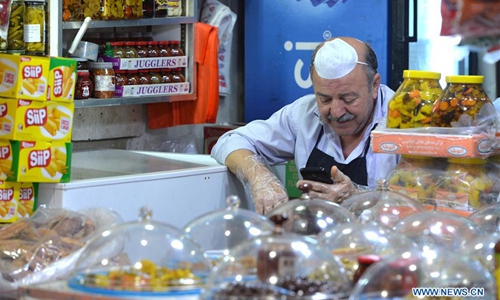HOME >> WORLD
Traditional Kuwaiti market shifts to digital due to coronavirus outbreak
Source:Xinhua Published: 2020/4/6 14:03:29

A grocery store vendor uses his mobile phone to check online orders of customers at the Al-Mubarakiya market in Kuwait City, Kuwait, April 5, 2020. The novel coronavirus pandemic leads to the closure of commercial centers, malls, and markets in Kuwait, including the old Al-Mubarakiya market in the capital Kuwait City. (Photo by Asad/Xinhua)
The novel coronavirus pandemic leads to the closure of commercial centers, malls, and markets in Kuwait, including the old Al-Mubarakiya market in the capital Kuwait City.
Known for perfumes, spices, gold and many more traditional Arab products, the Al-Mubarakiya market was the first tourist destination in Kuwait and many tourists visited it during holidays.
After the outbreak of the novel coronavirus in the country, shop owners in the old market decided to find ways to deliver products to customers to reduce their losses and the market has transformed into an online market.
Mohamed Sanad, an old tenant who rents a perfume shop in the market, told Xinhua that the majority of the owners at the market have agreed to sell their products through "almubarkiya.net" website.
The website offers a variety of products that the Kuwaiti customers used to buy from the Al-Mubarakiya market, he said, adding that it also provides a delivery service that the customers can enjoy.
Amer Hussein, a 63-year-old clothing shop owner, said that the website will save small businesses and allow them to practice their activities to guarantee income in such circumstances.
"Thanks to this website, we can continue our work and deliver our products before the curfew's hours," he said.
"My shop offers various type of Kuwaiti traditional clothes to deliver such as dishdasha and ghatra," he added.
The website has opened a new horizon for merchants after difficult days of the closure, Mohamed Sanad said, adding that it is promising and merchants will go through online selling experience.
It provides not only typical goods but also traditional sweets such as Al-Rahash, Baqlawa, Al-Naksa, Al-Darabeel, and Boqsomat, delivering them to customers' home during the quarantine.
Om Abeer, a 60-year-old customer, was excited to know about the website.
"I was very happy when my daughter told me that the Al-Mubarakiya market began to adopt the delivery service, where I can now purchase whatever I want without the struggle to find a parking spot," she told Xinhua.
Jassim Mohammed, a Kuwaiti citizen, did not expect that one day Al-Mubarkiya will close its doors and shift to online service.
"The power of the pandemic has changed many habits in the world as we haven't seen before," he stressed.
Since the COVID-19 outbreak in Kuwait, many stores have begun activating their mobile apps and social media accounts to promote their products, especially with the approaching month of Ramadan.
Meanwhile, the cooperative societies have also begun to deliver goods through online ordering service to avoid gatherings and limit the spread of coronavirus.
Kuwait reported on Sunday 77 new COVID-19 cases, bringing the total number in the country to 556, the Health Ministry said in a statement.
The Kuwaiti government has decided to impose a nationwide curfew to contain the spread of the coronavirus.
On March 13, Kuwait suspended all commercial flights. The government also decided to close stores, malls and barbershops.
Posted in: ASIA-PACIFIC